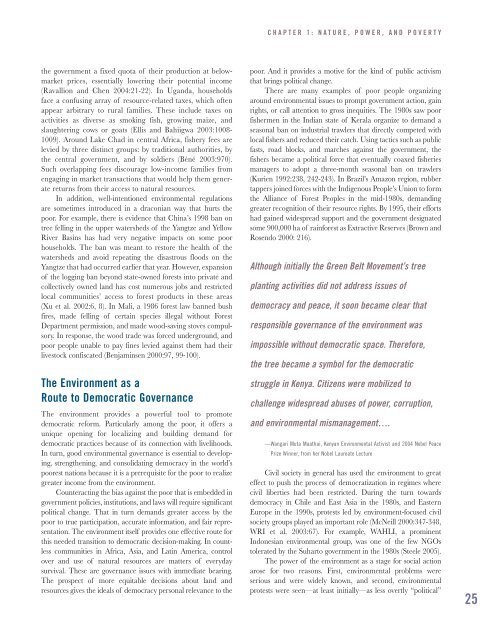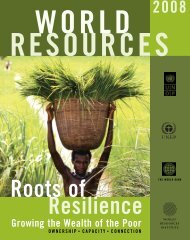jp8589 WRI.qxd - World Resources Institute
jp8589 WRI.qxd - World Resources Institute
jp8589 WRI.qxd - World Resources Institute
You also want an ePaper? Increase the reach of your titles
YUMPU automatically turns print PDFs into web optimized ePapers that Google loves.
CHAPTER 1: NATURE, POWER, AND POVERTY<br />
the government a fixed quota of their production at belowmarket<br />
prices, essentially lowering their potential income<br />
(Ravallion and Chen 2004:21-22). In Uganda, households<br />
face a confusing array of resource-related taxes, which often<br />
appear arbitrary to rural families. These include taxes on<br />
activities as diverse as smoking fish, growing maize, and<br />
slaughtering cows or goats (Ellis and Bahiigwa 2003:1008-<br />
1009). Around Lake Chad in central Africa, fishery fees are<br />
levied by three distinct groups: by traditional authorities, by<br />
the central government, and by soldiers (Béné 2003:970).<br />
Such overlapping fees discourage low-income families from<br />
engaging in market transactions that would help them generate<br />
returns from their access to natural resources.<br />
In addition, well-intentioned environmental regulations<br />
are sometimes introduced in a draconian way that hurts the<br />
poor. For example, there is evidence that China’s 1998 ban on<br />
tree felling in the upper watersheds of the Yangtze and Yellow<br />
River Basins has had very negative impacts on some poor<br />
households. The ban was meant to restore the health of the<br />
watersheds and avoid repeating the disastrous floods on the<br />
Yangtze that had occurred earlier that year. However, expansion<br />
of the logging ban beyond state-owned forests into private and<br />
collectively owned land has cost numerous jobs and restricted<br />
local communities’ access to forest products in these areas<br />
(Xu et al. 2002:6, 8). In Mali, a 1986 forest law banned bush<br />
fires, made felling of certain species illegal without Forest<br />
Department permission, and made wood-saving stoves compulsory.<br />
In response, the wood trade was forced underground, and<br />
poor people unable to pay fines levied against them had their<br />
livestock confiscated (Benjaminsen 2000:97, 99-100).<br />
The Environment as a<br />
Route to Democratic Governance<br />
The environment provides a powerful tool to promote<br />
democratic reform. Particularly among the poor, it offers a<br />
unique opening for localizing and building demand for<br />
democratic practices because of its connection with livelihoods.<br />
In turn, good environmental governance is essential to developing,<br />
strengthening, and consolidating democracy in the world’s<br />
poorest nations because it is a prerequisite for the poor to realize<br />
greater income from the environment.<br />
Counteracting the bias against the poor that is embedded in<br />
government policies, institutions, and laws will require significant<br />
political change. That in turn demands greater access by the<br />
poor to true participation, accurate information, and fair representation.<br />
The environment itself provides one effective route for<br />
this needed transition to democratic decision-making. In countless<br />
communities in Africa, Asia, and Latin America, control<br />
over and use of natural resources are matters of everyday<br />
survival. These are governance issues with immediate bearing.<br />
The prospect of more equitable decisions about land and<br />
resources gives the ideals of democracy personal relevance to the<br />
poor. And it provides a motive for the kind of public activism<br />
that brings political change.<br />
There are many examples of poor people organizing<br />
around environmental issues to prompt government action, gain<br />
rights, or call attention to gross inequities. The 1980s saw poor<br />
fishermen in the Indian state of Kerala organize to demand a<br />
seasonal ban on industrial trawlers that directly competed with<br />
local fishers and reduced their catch. Using tactics such as public<br />
fasts, road blocks, and marches against the government, the<br />
fishers became a political force that eventually coaxed fisheries<br />
managers to adopt a three-month seasonal ban on trawlers<br />
(Kurien 1992:238, 242-243). In Brazil’s Amazon region, rubber<br />
tappers joined forces with the Indigenous People’s Union to form<br />
the Alliance of Forest Peoples in the mid-1980s, demanding<br />
greater recognition of their resource rights. By 1995, their efforts<br />
had gained widespread support and the government designated<br />
some 900,000 ha of rainforest as Extractive Reserves (Brown and<br />
Rosendo 2000: 216).<br />
Although initially the Green Belt Movement’s tree<br />
planting activities did not address issues of<br />
democracy and peace, it soon became clear that<br />
responsible governance of the environment was<br />
impossible without democratic space. Therefore,<br />
the tree became a symbol for the democratic<br />
struggle in Kenya. Citizens were mobilized to<br />
challenge widespread abuses of power, corruption,<br />
and environmental mismanagement….<br />
—Wangari Muta Maathai, Kenyan Environmental Activist and 2004 Nobel Peace<br />
Prize Winner, from her Nobel Laureate Lecture<br />
Civil society in general has used the environment to great<br />
effect to push the process of democratization in regimes where<br />
civil liberties had been restricted. During the turn towards<br />
democracy in Chile and East Asia in the 1980s, and Eastern<br />
Europe in the 1990s, protests led by environment-focused civil<br />
society groups played an important role (McNeill 2000:347-348,<br />
<strong>WRI</strong> et al. 2003:67). For example, WAHLI, a prominent<br />
Indonesian environmental group, was one of the few NGOs<br />
tolerated by the Suharto government in the 1980s (Steele 2005).<br />
The power of the environment as a stage for social action<br />
arose for two reasons. First, environmental problems were<br />
serious and were widely known, and second, environmental<br />
protests were seen—at least initially—as less overtly “political”<br />
25

















